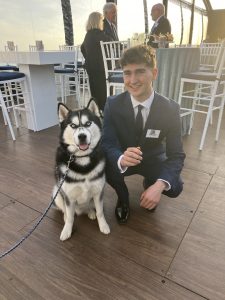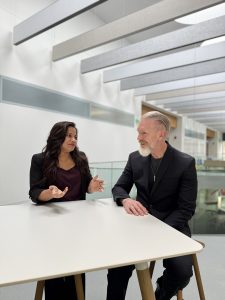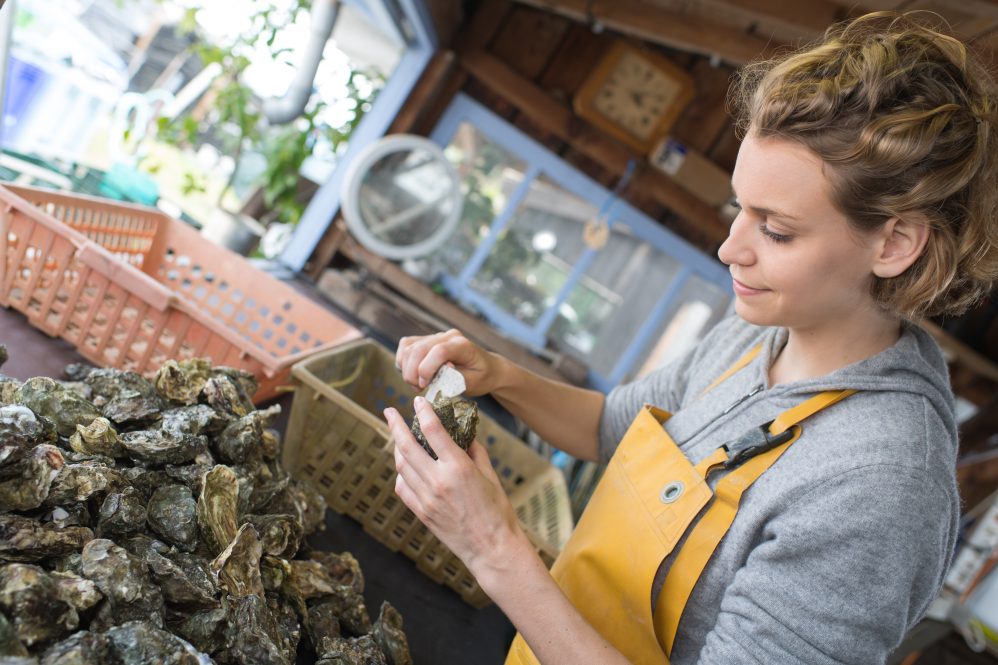Three impressive teams of entrepreneurs, whose startups range from more robust seafood to healthier laundry detergent to a great place for artists to share their talent, won this year’s Innovation Quest (iQ) entrepreneurship challenge.
The winning teams split $30,000 in prize money and will continue to develop their businesses in an advanced summer entrepreneurship incubator program at UConn.
“One thing that stood out to me is the amount of passion these students had about bringing their ideas to market,’’ says Professor Kevin Gardiner, director of the iQ program and a serial entrepreneur himself. “This year’s group, even more than most, was motivated by a desire to make a societal impact versus purely a desire to make millions.’’
Gardiner says interest in iQ remained strong this year, with 200 students, representing more than 60 majors, participating in the business preparatory workshops. Student startups ranged from video games to probiotics to personal health and lifestyle products. Not surprisingly, about 80% of the business proposals included an AI component.
“It was a phenomenal year, with an impressive group of students. All the judges remarked about how difficult it was to select finalists among so much talent,’’ he says. “If this enthusiasm keeps up, we may need to increase the iQ competition to twice a year.’’
Gardiner credits UConn’s entrepreneurship ecosystem for the quality of ideas that are presented. “Between the Werth Institute, the Connecticut Center for Entrepreneurship & Innovation (CCEI), entrepreneurship classes and more, innovation is front and center,’’ he says. “Even if students didn’t come to UConn to learn entrepreneurship, they are being exposed to it and are welcome to join in.’’
Here are the top three 2025 iQ finalists:
Shellfish Innovation Wins Top Prize
Since he was a kid growing up near UConn, senior Keegan Jalbert ’25 has been interested in agriculture, food systems, and innovation. Those passions led him to first work as a farmhand, and now he is developing his own farm.
“Growing up, my neighbors had an apple orchard where my family and I would go fruit picking in the summer. Later I worked at farms both in Connecticut and abroad,’’ he says. “I’ve always been interested in science that can help people who farm.’’

His startup, AccessFlora, develops healthy, pathogen-free shellfish seed (oysters and scallops), which is juvenile shellfish grown from larvae stage. The company took first place in the iQ competition and Jalbert was awarded $15,000.
AccessFlora produces seed in a hatchery, where the company’s innovation on the algal-free side enables them to raise shellfish seed to a much larger size than is typical. That means the company can offer farmers a more successful seed that reaches market-size faster. In addition, to ensuring a reliable supply of healthy shellfish seed to maximize farmers’ yields, they are creating opportunities for new shellfish farms. Jalbert’s goal is to work with farmers along the East Coast and incorporate his own shellfish farm in Connecticut.
Jalbert will graduate next month with extensive studies in biomanufacturing and agriculture. He took advantage of UConn’s co-op program and worked both at Boston Beer Company, in new product development, and as a microbiology intern at the U.S. Department of Energy’s Los Alamos Lab, working on drought tolerance in plants. Through exchange programs, he has learned about shellfish aquaculture in Melbourne, Australia, and Manabi, Ecuador, as well as here in Connecticut. These experiences advanced his knowledge in innovative agriculture and the food-products business.
UConn’s entrepreneurship programs, including iQ, have exposed Jalbert to business knowledge, increased his professional network, and helped him develop a go-to-market plan. He also worked closely with professor Mingyu Qiao, in the Department of Nutritional Sciences in the College of Agriculture, Health and Natural Resources, whom he described as a leader and innovator in sustainable food systems.
He credits the experts at the Connecticut Center for Entrepreneurship & Innovation for advocating for his success; SeaGrant for the connections to and understanding of the industry; and the NOAA Milford Lab for providing expertise in shellfish farming and industry needs.
Jalbert says he is encouraged by the progress his company has made.
“These are THE people to be working with if you want to advance innovation in this field,’’ he says.
“It has been a fun year with a lot of learning. We’ve made developments in the science behind our production, which applies well to the shellfish industry. We’ve seen a lot of traction,’’ he says. “Shellfish farming has significant environmental benefits along with producing healthy, locally grown seafood. This is an area where our work can have a positive impact on this sustainable seafood industry.’’
Mission of ‘404 Inc’: Healthier Planet, Healthier People
Doctoral candidate Pragati Rout and her business partner, Professor Greg Sotzing, share a love of science, a passion for innovation, and an undeniable enthusiasm for creating a healthier planet.
Their startup, 404 Inc., uses innovative organic materials which, when added to laundry detergents, brighten clothing in a manner that is healthier for the wearer and more friendly to the environment than current products, which use oil-industry derivatives. The startup took second place at iQ and received a $10,000 award.
“At our startup, we’re inspired by the natural glow of jellyfish—and we’re bringing that brilliance to everyday materials using compounds from the hemp plant,’’ Rout says.

“Our fabric color-enhancers are safe, plant-based, and completely non-toxic. They brighten fabrics gently without the need for harsh chemicals, offering an eco-friendly alternative that’s kind to both skin and the planet,’’ she says. “And with added antimicrobial properties, they help fabrics stay fresher for longer. It’s nature-powered innovation, designed for a cleaner, brighter future.”
Rout has always had an interest in business. In 2022, she created a startup in her native India, creating compost for organic farming. The business has grown well, and now employs 20 women.
“With 404 Inc., my second venture as an entrepreneur, the thing that excites me is applying my laboratory knowledge and experience toward something that is useful in real life and value-driven,’’ Rout says. “I hope my journey inspires other scientists and young women. If someone like me, from a small town, can step into entrepreneurship, others can too.’’
Through iQ and programs sponsored by the Connecticut Center for Entrepreneurship & Innovation, Rout says she learned about customer discovery and best business practices. She also received help with the patent process, developed a broader network, and fine-tuned her business pitch.
Sotzing, a professor of chemistry and material sciences, specializes in harnessing the potential of conductive polymers and developing their potential as revolutionary materials and their commercialization to solve societal challenges. He has been described as an eminent figure in higher education and scientific innovation.
“What I look for in a new idea or product is its ability to replace harmful substances currently threatening human and environmental health. Many everyday materials — from PFAS and BPAs to optical brighteners used in detergents — leave behind toxic byproducts. These chemicals don’t just disappear; they break down into carcinogens that enter our water systems, accumulate in landfills, and eventually make their way into our food chain,’’ he says.
“One emerging concern is microplastic contamination in edible plants — a stark reminder that what we produce industrially today directly shapes tomorrow’s ecosystem,’’ he says. “That’s why I’m excited about this innovation. It offers an opportunity to not only perform better but also to do so without poisoning the Earth in the process.’’
The next step for Rout and Sotzing will be to pitch at Yale Ventures on May 29, with hopes of engaging investors. Because of their UConn experiences, their presentation will be more successful, they say.
Engineering Student Strives to Solve Publicity, Visibility Problem
Patrick Mcdonald ’25 (ENG) and his friends love making music, animation, and other art. They wanted to promote their work online, but struggled to find an easy-to-use platform to do that.
Mcdonald, a mechanical engineering major, took on the challenge and created Mogulplex, a website where users can create their own personalized 3D rooms. He developed the site so that artists can share their work as well as links to their social media sites. His idea took third place in the iQ competition and he received a $5,000 award.
Mcdonald had to teach himself to code, something he did last summer after work. He enjoyed the challenge. “I’ve always wanted to run a business, to do my own thing and be a creative person. I want to be my own boss,’’ he says.

“I hate sitting around and not getting ahead. I wanted to build my skills and do something no one else was doing,’’ he says. “My friends and I are all very ambitious.’’
Although there are other websites available, they cater to large brands and aren’t fun to use, he says.
Mcdonald had heard of the iQ program and decided to investigate it.
“I was aware of iQ and always interested in it, but I felt like I didn’t have my ‘million-dollar idea’ yet. I realized there was no point in waiting. Most people have ideas but don’t do anything with them,’’ he says.
“The skills I’ve learned here will help me in whatever I do. I met with mentors who gave me good advice and clarity of direction,’’ he says. “Listening to the experts was a big help.’’
Mcdonald, who has interned at TRIUMPH Group Inc., providing engineering support for its assembly and testing department, is completing a senior project using a machine-learning algorithm using quantum computing technology to assist underwater autonomous drones with swarming. But the development of Mogulplex is his most passionate project.
He has employed a professional programmer, Tanner Byers, and he’s eager to build the brand and attract new clients. The coaching he’s received affirms that he’s moving in the right direction.
“I think there’s a future in it. I’m seeing good results,’’ he says. “These entrepreneurship programs have been a big motivator for me.’’



